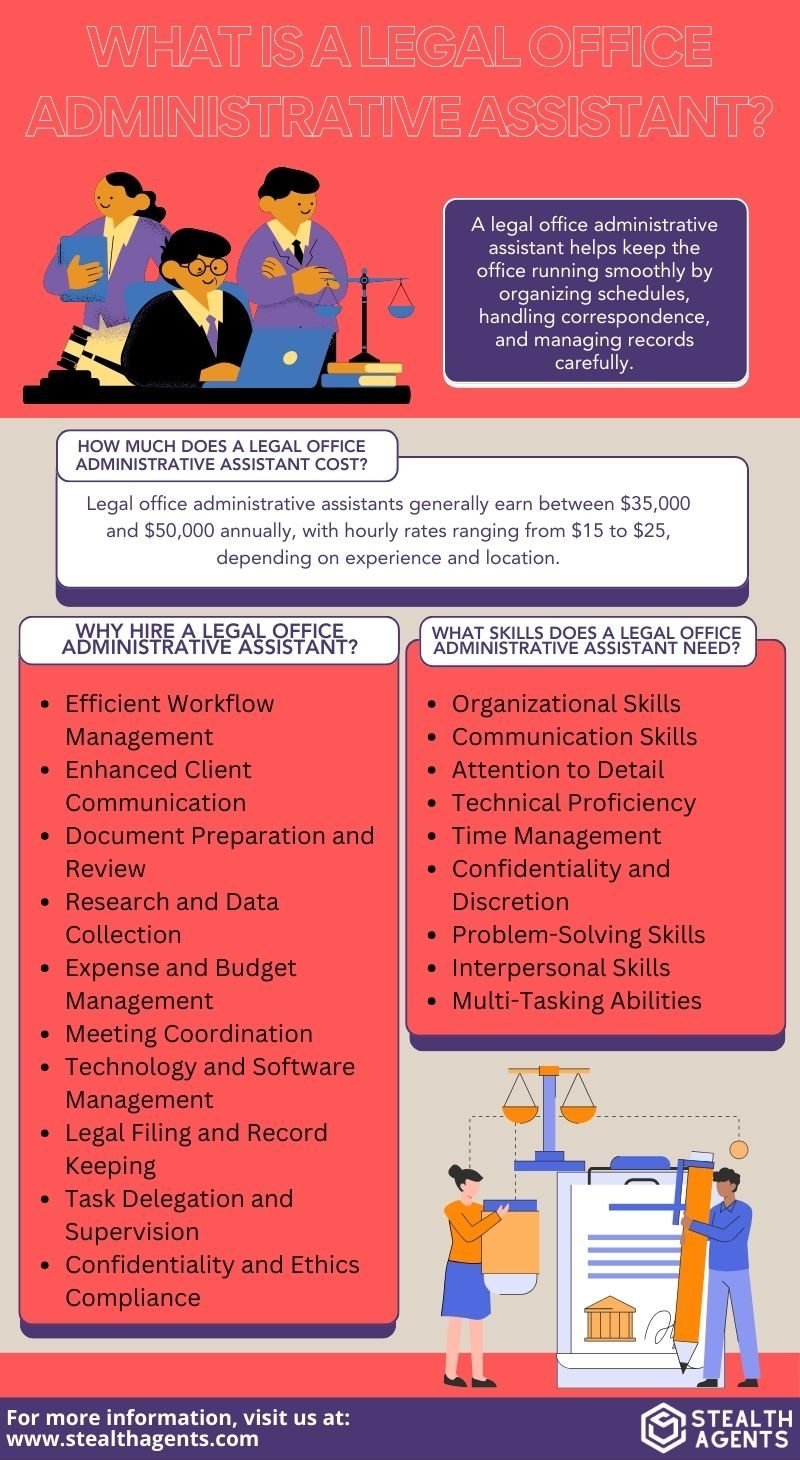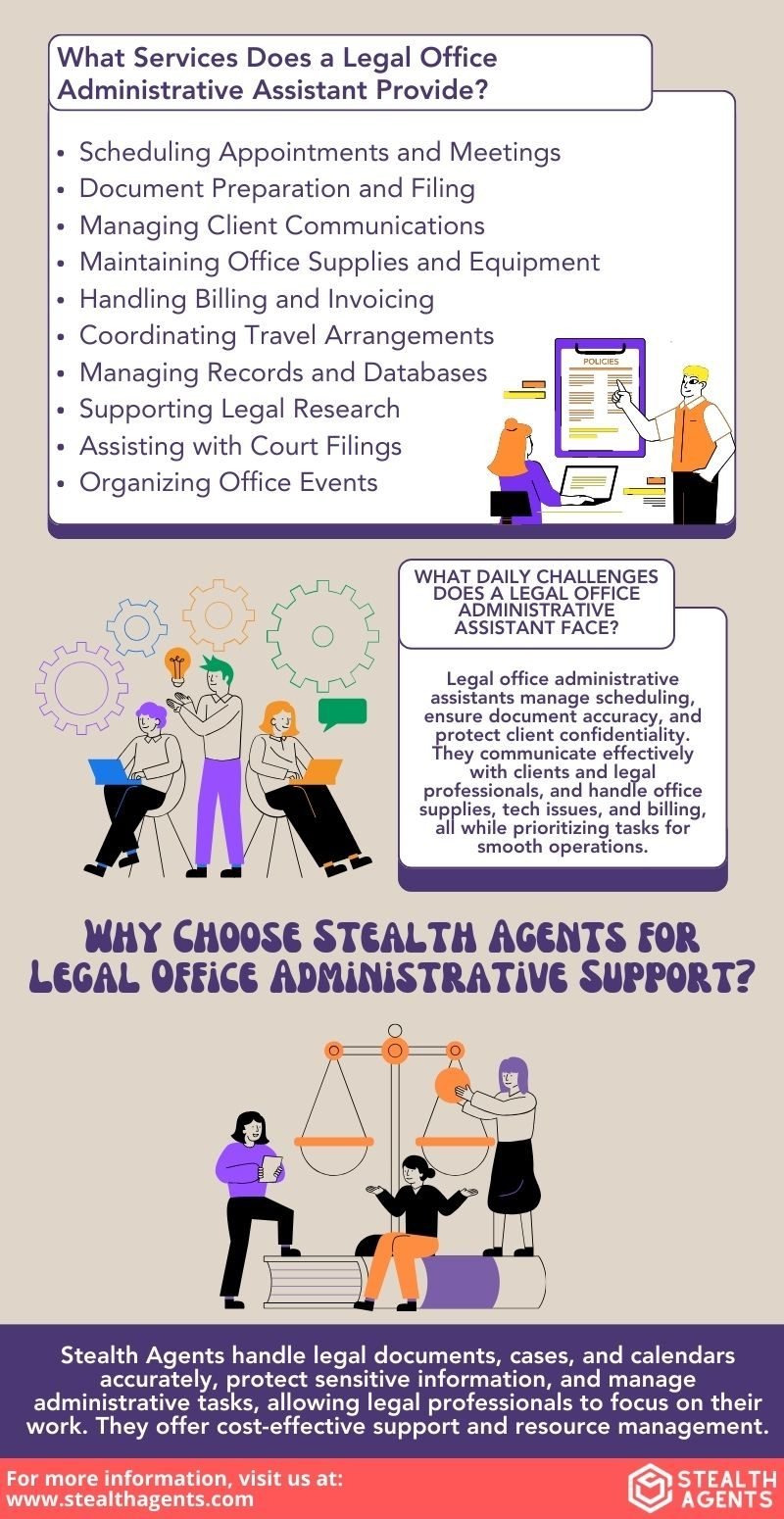A legal office administrative assistant ensures smooth day-to-day legal operations through skilled support. Stealth Agents delivers assistants who are detail-oriented, organized, and experienced in legal workflows.
Legal office administrative assistant services from Stealth Agents help law firms stay organized, streamline document management, and improve client communication without the overhead of in-house staff. With trained virtual assistants handling daily legal admin tasks, your team can focus fully on winning cases and serving clients efficiently.
A Legal Office Administrative Assistant helps streamline daily law firm operations by managing schedules, documents, and client communications with precision. Stealth Agents provides experienced legal admin assistants so your firm can stay organized, save time, and focus on winning more cases—get started today at stealthagents.com.
A legal office administrative assistant is key in keeping a legal practice running smoothly and efficiently.
Experts say they can save executives up to 8 hours a week by taking care of scheduling and managing documents.
With virtual assistants now available, businesses can get high-quality support without the cost of hiring full-time staff.
Stealth Agents specializes in providing highly skilled legal office administrative assistants. We offer free consultations to tailor our services to your needs and virtual assistant pricing.
Discover how our virtual assistants can transform your operations today!
How Does a Legal Office Administrative Assistant Differ from Other Office Support Roles?
While general office assistants, secretaries, and administrative assistants help keep businesses running smoothly, legal office administrative assistants bring a unique set of skills tailored specifically to law firms and legal departments.
The main difference lies in the specialized legal support they provide. In addition to routine administrative tasks, a legal office administrative assistant often:
- Handles sensitive legal documents and ensures they reach the correct parties.
- Manages legal calendars and tracks important case deadlines.
- Dockets cases and enters data into legal management systems.
- Prepares legal correspondence using precise legal terminology, understanding court policies and procedures.
Legal Requirements for Becoming a Legal Office Administrative Assistant
To work as a legal office administrative assistant, there are generally no special licensing or certification requirements. The main legal requirement is that candidates must be authorized to work in the United States, which includes citizens, permanent residents, and individuals with valid work permits or visas (such as DACA recipients, if eligible).
While some law firms may have additional preferences for education or experience, federal law mainly governs work eligibility. As long as you can legally work in the country and meet the hiring criteria set by employers, you’re eligible to apply for these roles. Background checks may also be required, especially since the position involves handling sensitive client information.
How Do Legal Office Assistant Requirements Change Over Time?
The qualifications and responsibilities for legal office administrative assistants aren’t set in stone they adapt as legislation, technology, and the needs of law firms evolve. For example, recent years have seen updates following changes in legal regulations, industry best practices, and advances in office software.
Law firms may periodically review job requirements, updating the necessary skill sets and educational standards to align with new laws or emerging technologies. These adjustments can include:
- Raising the minimum required skills, such as proficiency in the latest legal document management platforms or advanced calendaring apps.
- Updating confidentiality standards and protocols when handling sensitive client data, especially as data privacy laws change..
- Revising pay scales and benefit structures to stay competitive with market trends and employee expectations.
What Is a Legal Office Administrative Assistant?
A legal office administrative assistant helps keep the office running smoothly by organizing schedules, handling correspondence, and managing records carefully.
They need strong communication skills, the ability to use office software, and good problem-solving skills.
This law office administrative assistant often works in busy legal offices, works closely with lawyers, and manages tasks under pressure.
Legal office administrators usually require a high school diploma, but more education and ongoing learning can help them progress in their careers.
They must be good with people and keep information private, as they often deal with clients and sensitive details.
How Much Does a Legal Office Administrative Assistant Cost?
Legal office administrative assistants generally earn between $35,000 and $50,000 annually, with hourly rates ranging from $15 to $25, depending on experience and location.
Urban areas and larger law firms typically offer higher salaries, reflecting the cost of living and available resources.
Assistants with specialized education or certifications and those with additional skills like bilingualism can receive higher wages.
Full-time assistants often receive benefits such as health insurance, while part-time workers might earn more per hour but lack these perks.
The demand for these professionals and the investment in their ongoing training also influence their overall compensation.
Why Hire a Legal Office Administrative Assistant?
1. Efficient Workflow Management
These professional assistants streamline workflow by meticulously managing schedules and appointments.
They ensure that all critical documents are organized and ready whenever required.
This proficiency prevents delays and avoids missed deadlines, ensuring the office runs like a well-oiled machine.
2. Enhanced Client Communication
These virtual assistants manage client communications and keep clients well-informed and up-to-date.
They are the primary point of contact for any client concerns or inquiries.
This ensures clients receive professional and timely responses, enhancing their overall experience and satisfaction.
3. Document Preparation and Review
Preparing and reviewing legal documents precisely is a key task for a legal office administrative assistant.
They meticulously check documents for accuracy and compliance with legal standards.
This diligence minimizes the risk of errors and omissions, ensuring that all legal paperwork is flawless.
4. Research and Data Collection
They conduct comprehensive research and collect data to support legal proceedings and office functions.
They gather all pertinent information that attorneys need for case preparation.
This thorough approach ensures attorneys have the necessary details for making well-informed decisions.
5. Expense and Budget Management
Tracking and managing office expenses and budgets are crucial responsibilities of a legal office administrative assistant.
They meticulously record expenditures and monitor the budget to ensure compliance.
This financial oversight helps maintain the office’s economic health and promotes transparency.
6. Meeting Coordination
They coordinate and schedule meetings with clients, witnesses, and other relevant parties.
They make sure all logistical details are in place for productive meetings.
This coordination ensures a structured and organized meeting schedule that benefits everyone involved.
7. Technology and Software Management
Ensuring the seamless operation of office technology and software systems falls under the purview of a legal office administrative assistant.
They address technical issues promptly and oversee necessary software updates and maintenance.
This ensures the office’s technological infrastructure remains current and efficient.
8. Legal Filing and Record Keeping
Maintaining an organized system for legal files and records is a primary duty of a legal office administrative assistant.
They ensure documents are correctly filed and easily accessible when needed.
This organized approach aids in efficient case management and quick retrieval of records.
9. Task Delegation and Supervision
These expert assistants often take charge of delegating tasks and overseeing the work of junior staff.
They ensure tasks are executed accurately and on time.
This supervision fosters high productivity and maintains the quality of work within the office.
10. Confidentiality and Ethics Compliance
Upholding confidentiality and adhering to ethical standards is crucial for a legal office administrative assistant.
They handle sensitive information with the highest level of discretion and professionalism.
This commitment ensures the integrity and trustworthiness of the legal office are maintained.
What Skills Does a Legal Office Administrative Assistant Need?
1. Organizational Skills
Organizing is essential for a legal office administrative assistant to keep documents, schedules, and files in perfect order.
Misplacing essential documents can cause significant delays and frustration for clients and attorneys.
A streamlined organizational system guarantees smooth office operations and boosts overall productivity.
2. Communication Skills
Strong communication skills allow them to interact professionally with clients, attorneys, and court officials.
Clear communication minimizes misunderstandings and errors in legal proceedings, ensuring a smoother process.
These skills are crucial for drafting emails, letters, and other professional correspondence.
3. Attention to Detail
Attention to detail is indispensable for ensuring accuracy in legal documents and correspondence.
Even minor errors can lead to serious legal consequences and damage the office’s reputation.
Meticulously reviewing documents helps maintain the integrity and credibility of the legal practice.
4. Technical Proficiency
They must be proficient in using various software applications and office equipment.
Familiarity with word processing, spreadsheets, and legal-specific software significantly enhances efficiency and productivity.
Troubleshooting minor technical issues helps keep daily operations running smoothly.
5. Time Management
Time management is critical for prioritizing tasks and meeting deadlines in a bustling legal environment.
Efficiently managing time reduces stress and significantly improves job performance.
Balancing numerous responsibilities requires adeptness in allocating time effectively to each task.
6. Confidentiality and Discretion
Handling sensitive information with confidentiality and discretion is paramount for a legal office administrative assistant.
Breaching confidentiality can result in severe legal and ethical repercussions.
Maintaining high privacy standards builds trust and upholds the office’s professional reputation.
7. Problem-Solving Skills
Problem-solving skills are essential for addressing and resolving unexpected issues quickly and effectively.
Being resourceful and quick-thinking is crucial in navigating the challenges that arise in a legal setting.
Efficiently providing solutions ensures continuous workflow and enhances client satisfaction.
8. Interpersonal Skills
Interpersonal skills are vital for building and maintaining positive relationships with colleagues and clients.
These skills include empathy, active listening, and effective conflict resolution.
Strong interpersonal skills foster a collaborative and supportive work environment, benefiting everyone involved.
9. Multitasking Abilities
They must excel at handling multiple tasks simultaneously without compromising quality.
Juggling various responsibilities requires focus and adapting quickly to changing priorities.
Effective multitasking boosts overall productivity and office efficiency.
10. Legal Knowledge
Possessing basic legal knowledge is advantageous for understanding and supporting legal processes effectively.
Familiarity with legal terminology and procedures enhances communication with attorneys and clients.
This foundational knowledge allows for more accurate and confident task performance.
What Services Does a Legal Office Administrative Assistant Provide?
1. Managing Client Communications
They expertly handle client communications, promptly addressing phone calls and emails.
They meticulously relay essential messages to the appropriate attorney, guaranteeing timely client follow-ups.
This pivotal role upholds seamless communication channels within the legal office.
2. Scheduling Appointments and Meetings
Coordinating appointments and meetings for attorneys is a crucial duty of a legal office administrative assistant.
Their outsourced appointment-setting services ensure that everyone’s availability matches the schedule of clients, witnesses, and other parties.
This diligent coordination keeps the office smooth and uninterrupted.
3. Document Preparation and Filing
These professional virtual assistants are adept at preparing and filing essential legal documents.
They meticulously draft, proofread, and organize documents like pleadings, motions, and contracts.
This ensures everything is in perfect order for court proceedings and client consultations.
4. Handling Billing and Invoicing
Managing billing and invoicing for clients is a key responsibility of the legal office administrative assistant.
They accurately track billable hours, prepare detailed invoices, and ensure timely payment collections.
This financial oversight is vital for the office’s fiscal health.
5. Maintaining Office Supplies and Equipment
Another duty of these professional assistants is to ensure the office is well-stocked and equipped.
They maintain an inventory of necessary supplies and ensure all equipment functions properly.
This proactive approach supports a productive and efficient workplace.
6. Coordinating Travel Arrangements
These tailored assistants skillfully handle travel arrangements for attorneys and staff.
They book flights, hotels, and rental cars, ensuring every travel detail is seamlessly organized.
This comprehensive support allows attorneys to focus solely on their cases without logistical concerns.
7. Managing Records and Databases
Managing client and case records precisely is a vital service a legal office administrative assistant provides.
They ensure all information is accurately recorded and easily accessible.
This meticulous record-keeping facilitates quick retrieval of crucial information when needed.
8. Supporting Legal Research
These legal administrative assistants are essential in supporting legal research efforts.
Legal administrative professionals gather relevant information, organize research materials, and assist attorneys in case preparation.
This invaluable support helps attorneys build strong, well-informed cases.
9. Assisting with Court Filings
Their significant responsibility is ensuring timely and accurate court filings.
They handle the filing of all necessary documents, preventing delays and errors.
This diligence ensures that legal processes continue smoothly and efficiently.
10. Organizing Office Events
Another vital service they provide is planning and coordinating office events.
They organize events such as client meetings, office parties, and seminars, fostering a positive work environment.
These well-planned events help strengthen team cohesion and client relationships.
What Daily Challenges Does a Legal Office Administrative Assistant Face?
Legal office administrative assistants juggle complex scheduling, ensuring vital appointments and meetings remain conflict-free.
They meticulously prepare and review documents, safeguarding against costly errors and ensuring legal compliance.
Confidentiality is paramount, and strict protocols protect sensitive client information.
Daily interactions with clients and legal professionals necessitate excellent communication skills, which foster trust and collaboration.
Additionally, they efficiently manage office supplies, technology troubleshooting, and billing processes, all while prioritizing multiple tasks to maintain smooth operations.
Why Choose Stealth Agents for Legal Office Administrative Support?
Stealth Agents handle legal documents with great care and accuracy, ensuring everything follows the rules.
They manage cases and calendars effectively, helping to avoid missed deadlines and improving overall productivity.
They protect sensitive details and maintain good client relationships by keeping information private and ensuring clear communication.
They handle administrative tasks efficiently, allowing legal professionals to concentrate on their main work.
Choosing Stealth Agents is a cost-friendly way to get excellent support, build client trust, and use resources wisely.
Takeaways
A legal office administrative assistant must ensure any law firm’s smooth operation.
By handling many tasks, such as managing schedules, preparing legal documents, and maintaining client records, these professionals enable lawyers to focus on their core responsibilities.
These tailored professional assistants’ precision and expertise enhance productivity and improve client service.
Investing in such a role within your legal practice can increase efficiency and better case outcomes.
To experience these benefits without the overhead, consider utilizing the exceptional virtual assistant services from Stealth Agents today.

Frequently Asked Questions
How does a legal office administrative assistant improve document security?
Legal office administrative assistants keep documents safe by following strict rules for confidentiality, using secure digital filing systems, and making sure only authorized people can access sensitive information. They also use secure storage methods and update security measures regularly to protect client data.
What tools can a legal office administrative assistant use for task management?
They can use tools like Trello, Asana, or Microsoft Planner to organize their tasks. These tools help them keep track of deadlines, set reminders, and manage their work in an organized way.
How can a legal office administrative assistant support remote working environments?
They help with remote work by using cloud-based software to manage documents, video conferencing tools for meetings, and secure platforms for communication. They make sure everything runs smoothly and that client information stays private.
What are the top legal software programs a legal office administrative assistant should know?
They should know programs like Clio, MyCase, and PracticePanther. These tools help with managing cases, billing, and communicating with clients, making it easier to handle legal tasks.
How do legal office administrative assistants contribute to client retention?
They help keep clients happy by communicating professionally, answering questions quickly, and keeping client records organized. Their attention to detail builds trust and makes clients more likely to stay with the law firm.
How does a legal office administrative assistant handle urgent legal matters?
When urgent matters come up, they focus on the most important tasks first by rescheduling less urgent ones. They quickly find and prepare important documents and communicate with attorneys to address the client’s needs right away.
What role does a legal office administrative assistant play in compliance management?
They help the office follow legal rules by keeping records updated, staying informed about changes in laws, and making sure the office’s practices meet current legal standards. This helps avoid problems related to compliance.
How do legal office administrative assistants assist with legal research?
They help with legal research by collecting information, organizing materials, and helping attorneys access legal databases. This ensures attorneys have everything they need to prepare for cases.
How do legal office administrative assistants manage stress and high workloads?
They handle stress by managing their time well, breaking big tasks into smaller ones, and using tools to prioritize their work. Taking short breaks and working as a team also helps them stay focused and productive.
What career advancement opportunities exist for legal office administrative assistants?
They can grow their careers by continuing their education, earning certifications in paralegal studies, or specializing in areas like intellectual property or corporate law. These steps can lead to higher-paying jobs with more responsibilities in the legal field.












